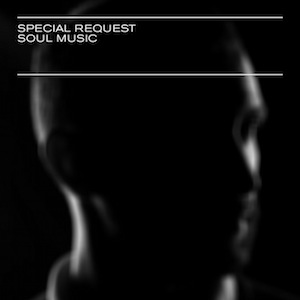Special Request Soul Music
There’s something undeniably timely about the release of the breakbeat-driven, pirate-radio-inspired debut album from Paul […]

There’s something undeniably timely about the release of the breakbeat-driven, pirate-radio-inspired debut album from Paul Woolford‘s Special Request alias. After all, talk of jungle increasingly seems to be on everyone’s lips these days, and the dance-music world has recently seen a series of critically acclaimed albums with sonic touchstones firmly entrenched in the era of classic rave and jungle, such as Lee Gamble’s Diversions 1994-1996 and Zomby’s With Love. Furthermore, the Special Request 12″s that Woolford has diligently released over the last year have been some of the most striking contemporary engagements with that halcyon era, infusing the music’s rhythmic backbone with elements of techno while incorporating the sonic grit of pirate radio. That said, Soul Music doesn’t feel like an elegiac tribute to a lost era; rather, it’s a call to reinstate jungle as a viable force in big-room club music.
Listening to Soul Music, one is immediately aware of its sizable low end. Woolford cunningly injects his junglist sub-bass with a straight-on robustness that evokes the techno-leaning productions of his own past. This lends tracks like “Body Armour”—with its pulsating kicks and elusive synths—a sense of tension and release that’s completely foreign to jungle, but no less effective here. Equally impressive are the uncompromising breakbeats that Woolford has strewn over much of the record, such as “Ride VIP”‘s scattered and time-stretched drum & bass, or “Broken Dreams”‘ heavily EQ’d assault. Similarly, the aptly named “Deranged” twists its tunnel-vision breaks through some seismically heavy bass, and by pairing them with the tune’s clipped and warped vocals, Woolford takes the track into the headiest realms of junglist bass science. For all of Soul Music‘s bass muscle though, there’s a charming messiness to much of the album, which recalls Woolford’s stated aim of evoking the feeling and sensibility of pirate radio. Opening track “Forbidden” is one of the album’s least dancefloor-oriented tracks, but also one of its strongest, as it hints at a gauzy, nostalgia-steeped side to Woolford’s Special Request project. Using a string line that evokes the likes of Orbital, The Orb, or Future Sound of London, the track pairs rumbling low end with loose breakbeats, giving the whole thing a shimmering, barely there quality. Elsewhere, there’s a far-away feeling to much of the LP, as tunes emerge from fuzz and static, only to fade back into the murk, as though a transmission is being lost. The pirate-radio aesthetic even stretches to a number of voice breaks on Soul Music, where an MC urges the crowd to get off the stage so they’ll stop jumping the records; it’s an amusing touch, albeit one that’s maybe a bit heavy-handed.
Soul Music is a massive collection of tracks; in addition to the 12-track, hour-long album proper, the CD version comes packaged with an additional 11-track bonus disk, featuring nearly 80 minutes of music in the form of previously released Special Request tracks, as well as remixes from the likes of Anthony Naples, Kassem Mosse, Anthony “Shake” Shakir, and Lee Gamble. There’s even Woolford’s remix of Lana del Rey’s “Ride,” which continues the venerable UK hardcore tradition of flipping pop vocals and infuses the track with rolling breakbeats, resulting in a tune that oozes psycho-sexual tension. Many of the previously released Special Request tracks on the bonus disc follow a similar template to the album, most notably on the evocative, breaks-driven techno of “Mindwash.” It’s the remixes of Woolford’s tracks by others that are the true gems of the second disc though. Anthony Naples roughs up “Mindwash” considerably, and his scruffy, scuffed version of the track arguably hues closer to the haphazard spirit of jungle than the original, while Anthony “Shake” Shakir’s version of the same track dispenses with breakbeats altogether to offer up an elegantly assembled slice of 4/4 techno. Lee Gamble’s remix of “Capsules,” on the other hand, is an almost beatless track, and by retaining only the original’s mournful strings, vocal samples, and occasional deep bass notes, it presents a deconstructed, oceanic version of jungle not dissimilar to that found on his Diversions LP.
If there’s any complaint to be made about Soul Music, it’s that it falls into a trap very similar to that of Zomby’s recent With Love album; simply, there’s just a huge amount of music to wade through here. And while it may be eloquently and compellingly conceptualized, this doesn’t make nearly two-and-a-half hours of very similar-sounding music easy to listen to in one sitting. In just about every other respect however, Soul Music is a success. Spurred by excellent, challenging production, the record maintains an adequate sonic distance from its inspirations, and the bonus disc’s excellent selection of remixes fosters a dialogue between jungle, house, and techno’s past and present.

